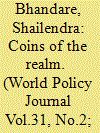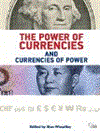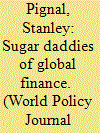|
|
|
Sort Order |
|
|
|
Items / Page
|
|
|
|
|
|
|
| Srl | Item |
| 1 |
ID:
133455


|
|
|
|
|
| Publication |
2014.
|
| Summary/Abstract |
OXFORD, England-We live in a globalized world where financial developments in one region can have an impact on a vastly different and geographically disparate location. The forces joining them are those of money, wealth, and finance, which are deeply interlinked, or so we tend to think. But the world around us has always been globalized, albeit to different degrees and involving different shades of financial undercurrents. An interesting prism to see this continual globalization is through the role itinerant and global currencies and monetary unions have played.
Money is often defined as "as any object (or record of that object) which is regularly used to make payments according to a law which guarantees its value and ensures its acceptability." Acceptance is thus at the core of any particular object being used as money. The spread of monetary traditions across regions happens because people from diverse locations accept particular monies, in the form of coins, paper, or other instruments, to make payments. The fact that coins can circulate as monetary objects greatly enhances their utility. They enable money to be spent and saved by facilitating their division.
|
|
|
|
|
|
|
|
|
|
|
|
|
|
|
|
| 2 |
ID:
126801


|
|
|
|
|
| Publication |
London, IISS, 2013.
|
| Description |
156p.Pbk
|
| Standard Number |
9781138023604
|
|
|
|
|
|
|
|
|
|
|
|
Copies: C:1/I:0,R:0,Q:0
Circulation
| Accession# | Call# | Current Location | Status | Policy | Location |
| 057556 | 332.4/WHE 057556 | Main | On Shelf | General | |
|
|
|
|
| 3 |
ID:
130540


|
|
|
|
|
| Publication |
2014.
|
| Summary/Abstract |
Should Asia feel anxious about China's expansion? We look for the answer through the Bayesian estimation of a two-country New Keynesian model of production fragmentation covering ten Asian economies, including China. The estimates show that vis-à-vis China, the developed Asia has a more fragmented production structure with higher domestic value-added embodied in intermediates traded with China whereas the developing Asian production chains are equally if not less fragmented with more foreign value-added. We also find that China's expansion made possible by favorable demand and price shocks benefits all Asian neighbors. Expansion driven by total factor productivity improvement, however, lifts the aggregate value-added in the developing Asia but not in the developed Asia, unless the shocks symmetrically originate in both China and the developed Asia. Fixing the regional currencies irrevocably to the U.S. dollar amplifies the effect of China's productivity improvements, although it is nearly irrelevant for responses to other types of shocks. We conclude that production fragmentation and symmetry in shock are the keys to the answers of this question.
|
|
|
|
|
|
|
|
|
|
|
|
|
|
|
|
| 4 |
ID:
133457


|
|
|
|
|
| Publication |
2014.
|
| Summary/Abstract |
LONDON-One of the cornerstones of Marxist-Leninist thinking is that the state should control the "commanding heights" of an economy-industry, agriculture, infrastructure, and, perhaps above all, money and banking. That vision has largely perished, with one gaping exception. Government remains omnipotent in the financial system, not only on Wall Street or Threadneedle Street, but far beyond. Across the world, the state weighs in on all sides of the ledger, insuring both a bank's assets (mortgages and loans) and its liabilities (deposits). State intervention in banking ranges from muscular day-to-day regulation through to crisis-time bailouts, and is an entirely accepted feature of the financial system. Financiers complain about excessive red tape, because that is what all businessmen do. But absent the state's involvement in their sector, it is a safe guess far fewer would still be gainfully employed following the carnage of 2008. Those who survived would likely find their ensuing careers to be nasty, brutish, short, and entirely devoid of outsized bonuses.
|
|
|
|
|
|
|
|
|
|
|
|
|
|
|
|
|
|
|
|
|